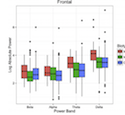Abstract
Attention-Deficit/Hyperactivity Disorder (ADHD) is a heterogeneous disorder. Current subtypes lack longitudinal stability or prognostic utility. We aimed to identify data-driven biotypes using multiple cognitive measures, then to validate these biotypes using EEG, ECG, and clinical response to atomoxetine as external validators. Study design was a double-blind, randomized, placebo-controlled crossover trial of atomoxetine including 116 subjects ages 6 through 17 with diagnosis of ADHD and 56 typically developing controls. Initial features for unsupervised machine learning included a cognitive battery with 20 measures affected in ADHD. External validators included baseline mechanistic validators (using electroencephalogram/EEG and electrocardiogram/ECG) and clinical response (ADHD Rating Scale and correlation with cognitive change). One biotype, labeled impulsive cognition, was characterized by increased errors of commission and shorter reaction time, had greater EEG slow wave (theta/delta) power and greater resting heart rate. The second biotype, labeled inattentive cognition, was characterized by longer/more variable reaction time and errors of omission, had lower EEG fast wave (beta) power, resting heart rate that did not differ from controls, and a strong correlation (r = −0.447, p < 0.001) between clinical response to atomoxetine and improvement in verbal memory immediate recall. ADHD comprises at least two biotypes that cut across current subtype criteria and that may reflect distinct arousal mechanisms. The findings provide evidence that further investigation of cognitive subtypes may be at least as fruitful as symptom checklist-based subtypes for development of biologically-based diagnostics and interventions for ADHD.
